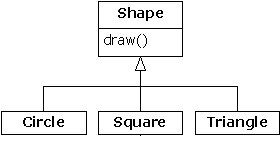//: PetCount.java
// Using instanceof
package c11.petcount;
import java.util.*;
class Pet {}
class Dog extends Pet {}
class Pug extends Dog {}
class Cat extends Pet {}
class Rodent extends Pet {}
class Gerbil extends Rodent {}
class Hamster extends Rodent {}
class Counter { int i; }
public class PetCount {
static String[] typenames = {
"Pet", "Dog", "Pug", "Cat",
"Rodent", "Gerbil", "Hamster",
};
public static void main(String[] args) {
Vector pets = new Vector();
try {
Class[] petTypes = {
Class.forName("c11.petcount.Dog"),
Class.forName("c11.petcount.Pug"),
Class.forName("c11.petcount.Cat"),
Class.forName("c11.petcount.Rodent"),
Class.forName("c11.petcount.Gerbil"),
Class.forName("c11.petcount.Hamster"),
};
for(int i = 0; i < 15; i++)
pets.addElement(
petTypes[
(int)(Math.random()*petTypes.length)]
.newInstance());
} catch(InstantiationException e) {}
catch(IllegalAccessException e) {}
catch(ClassNotFoundException e) {}
Hashtable h = new Hashtable();
for(int i = 0; i < typenames.length; i++)
h.put(typenames[i], new Counter());
for(int i = 0; i < pets.size(); i++) {
Object o = pets.elementAt(i);
if(o instanceof Pet)
((Counter)h.get("Pet")).i++;
if(o instanceof Dog)
((Counter)h.get("Dog")).i++;
if(o instanceof Pug)
((Counter)h.get("Pug")).i++;
if(o instanceof Cat)
((Counter)h.get("Cat")).i++;
if(o instanceof Rodent)
((Counter)h.get("Rodent")).i++;
if(o instanceof Gerbil)
((Counter)h.get("Gerbil")).i++;
if(o instanceof Hamster)
((Counter)h.get("Hamster")).i++;
}
for(int i = 0; i < pets.size(); i++)
System.out.println(
pets.elementAt(i).getClass().toString());
for(int i = 0; i < typenames.length; i++)
System.out.println(
typenames[i] + " quantity: " +
((Counter)h.get(typenames[i])).i);
}
} ///:~